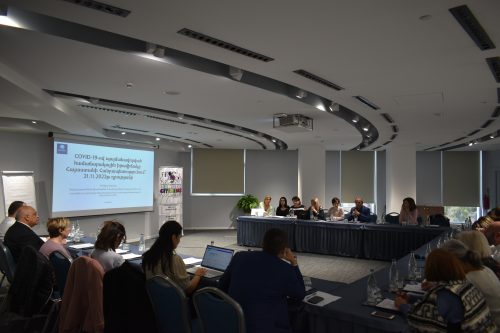 |
EU COVID-19 Solidarity Programme for the Eastern Partnership Standing Together |
Project title: COVID-19 Solidarity Programme 2020-2022
On 22 November 2022, HCA Vanadzor held a discussion-workshop of the policy brief “Effective State Protection of the Rights of Persons with Mental Health Problems in the Pandemic-Related Emergency Situations” in Yerevan. The aim of the workshop was to discuss the policy brief with stakeholders and finalize the document based on the submitted observations.
The document has been prepared within the framework of the project “Contribute to the adoption of procedures for systemic response to pandemics in psychiatric institutions in Armenia”.
In crisis situations such as the pandemic, it is more difficult to assure the rights of representatives of vulnerable groups. Confined in institutions, persons with mental health problems got more isolated in the conditions of the pandemic-related rules, not even having an opportunity to communicate with their relatives.
How could this situation have been prevented or mitigated; what potential solutions are there applied in the world, what can countries do in case of facing a similar problem in the future?
To find answers to these questions, we initiated development of this document, for which we first made visits to psychiatric institutions of the Republic of Armenia to understand how they practically operated during the pandemic, after which we visited Georgia and Moldova to explore their local practices, and then we combined all this with legislative regulations and international standards. The document also addresses problems conditioned by peculiarities of mental health systems, and the solutions used in this context.
Ultimately, the document presents recommendations aimed at ensuring the rights of persons with mental health problems in pandemic-related emergency situations.
The workshop was attended by representatives of state authorities, psychiatric institutions, 24/7 care homes, public observation groups, as well as our partners from Georgia and Moldova, who presented their experience.
In his opening speech, HCAV Chairperson Artur Sakunts attached importance to this initiative, noting that the document gives an opportunity to combine international standards, as well as other countries’ experience in combating the pandemic in psychiatric institutions, which gives an opportunity to work to eliminate consequences of and prevent similar situations.
Head of the Department of Epidemiology of Infectious and Non-Infectious Diseases at the National Center for Disease Control and Prevention Romella Abovyan presented the COVID-19 pandemic situation in Armenia, and particularly addressed the pandemic-related situation and challenges in psychiatric institutions.
Further, our partners from Georgia and Moldova presented the experience of their countries.
President of the Society of Georgian Psychiatrists Eka Chkonia, who also supported us during our visit to Georgia, presented the Georgian experience of combating pandemics in psychiatric institutions, as well as Georgia’s strategic priorities in the mental health sphere.
“After nearly three years of the pandemic, social isolation and strained socio-economic circumstances caused a 25% global rise in depression and anxiety.
Children and young people could feel the impact of COVID-19 on their mental health and well-being for many years to come.
It’s very important to consolidate our knowledge and learned lessons through the pandemic and use it to resist future challenges.
This policy document is a good source of information for all our countries as we can learn from each other a lot”, E. Chkonia notes.
Svetlana Doltu, expert at the Moldovan Institute for Human Rights, presented the mental health system in Moldova and the experience of Moldova’s psychiatric institutions in withstanding COVID-19.
“Moldova, Armenia and Georgia have similar experience. In these terms, the solutions identified by each country are largely applicable to all, so the Report presents an opportunity for the transfer of good practices between governmental and non-governmental actors, including the implementation of the gender dimension and human rights in mental health services and is only a first step for the continuation of collaboration and the inter-institutional and international dissemination of good practices in health and mental well-being”, S. Doltu notes.
The specialist participating in the workshop presented their observations and their experience in combating the pandemic in psychiatric institutions. Based on the submitted observations, the document will be finalized and published before long.
The project grant was provided by the Netherlands Helsinki Committee as a result of the call for proposals in the frame of “COVID-19 in penitentiary institutions and psychiatric institutions” for civil society organizations of EU-funded COVID-19 Solidarity Programme 2020-2022 for Eastern Partnership Countries.
The aim of the programme is to support civil society organizations to respond to immediate and longer-term impacts of the COVID-19 pandemic in the region. The programme is a part of the activities implemented by the Netherlands Helsinki Committee (in cooperation with Global Initiative on Psychiatry), jointly with People in Need and AFEW International.
———————
This publication was prepared with the support of the European Union. Its contents are the sole responsibility of Helsinki Citizens’ Assembly-Vanadzor, and they do not necessarily reflect the views of the European Union.
 |

